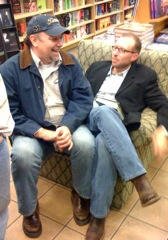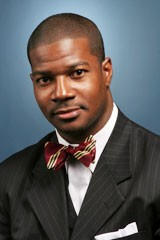 In my latest book, The New Christians, I cast Brad Cecil as the unheralded protaganist of the emergent movement . In many ways, he was. Coming from an ultra-conservative world of youth evangelism, he volunteer-pastored at a Texas mega-Bible church. And he read Rorty and Derrida. He was the intellectual rudder of the Young Leaders Network from 1996 through about 2000.
In my latest book, The New Christians, I cast Brad Cecil as the unheralded protaganist of the emergent movement . In many ways, he was. Coming from an ultra-conservative world of youth evangelism, he volunteer-pastored at a Texas mega-Bible church. And he read Rorty and Derrida. He was the intellectual rudder of the Young Leaders Network from 1996 through about 2000.
(That’s Brad in the pic, with me in Dallas last year.)
Brad’s engaged in more private than public endeavors now, but he occasionally breaks his silence and blogs. And when he does, it’s invariably good.
Last week, he posted twice. Once on a book he thought he’d write:
My basic idea in the writing was this: Modern philosophical concepts
of “truth” have killed it, turning “truth” into this static thing that
is “out there” instead of a dynamic thing that is shaped by
participation. This concept of truth de-motivates us by suggesting
that “truth” can not change – it can only be discovered. As the church
bought into the modern concept it changed the role of the church from
being a participatory truth changer in culture to being a truth
dispenser focused on the individual. The shift to the individual
provides the framework that we are now trapped in – the framework that
suggests that the individual possess “truth” (as long as they are
rational and informed) and does not need anyone else(except to inform).
Everything that exists outside the individual is just a commodity for
the individual to be consumed and only valued by the “felt needs” of
the individual. My conclusion – at this point in church history – we
have actually elevated the individual to a “god-like” position and
subsequently positioned Christ as the ultimate consumer commodity for
the individual. etc etc etc.
His other post addresses something that happened as a result of my book. In it, I related the time that Mark Driscoll guest-preached at Brad’s church and cussed, against Brad’s wishes. Recently, Mark asked me for Brad’s email, which I gave him, and the two have reconciled. Brad mentions his forgiveness of and admiration for Mark, but then he says what he really thinks about Mark’s theology:
My opinion is that the failure of modern philosophical/theological
assumptions caused this return to “calvinism” as people grasp to the
comfort of the convoluted evangelical concept of “sovereignty” that
exists in that circle. neo-calvinism is such a waste – classic
calvinism was built on a covenant hermeneutic and, at least, held a
“cultural mandate”; neo-calvinism is built on a dispensational
hermeneutic and has no mandate at all. neo-calvinism is cheap, easy and
good-for-nothing and it is not at all “true to scripture” as is often
claimed.
Being that the “New Calvinism” was just named one of the top ten new movements to watch in 2009 byt TIME Magazine, Brad’s criticism is all the more relevant.
